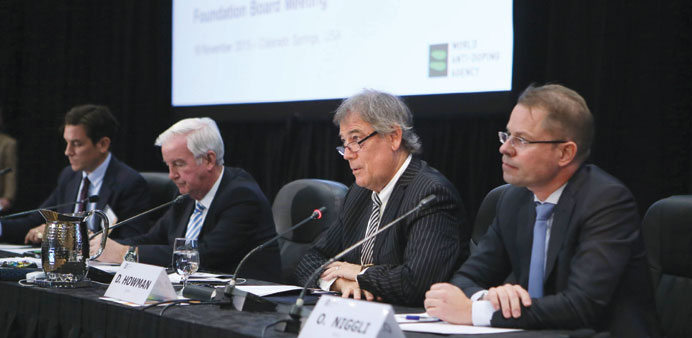David Howman (second right), Director General of WADA, speaks during a World Anti-Doping Agency Foundation press conference in Colorado. (AFP)
AFP/Colorado
Russia’s anti-doping agency (RUSADA) was suspended by the World Anti-Doping Agency (WADA) on Wednesday, raising the possibility of Russian track stars being barred from the Olympics if the country does not fall back into line with accepted international rules. WADA’s foundation board unanimously passed a recommendation from a committee which found RUSADA non-compliant with the global body’s charter.
The decision had been anticipated following a damning report by a WADA independent panel which uncovered a state-sponsored doping program in Russia. RUSADA had been heavily implicated in the scandal and was accused of destroying samples requested for analysis by WADA.
The International Association of Athletics Federations (IAAF) had already provisionally suspended Russia from international competition last week but left the door open to a return in time for the Olympics.
WADA’s ruling on Wednesday piles more pressure on Russia to fix its system. Under rules agreed by WADA and the International Olympic Committee (IOC) only countries in full compliance with the anti-doping agency’s code can participate in the Games. Russia has vowed to follow a roadmap laid down to overhaul its drug-testing program in order to avert the prospect of an Olympic ban—a nuclear option that neither the IAAF nor the IOC wants to see.
WADA President Craig Reedie insisted however that the agency would move to ensure a “watertight” anti-doping regime in Russia.
“Make no mistake, we will not rush this process of compliance, we will do it right—the integrity of sport is under threat,” Reedie said in a statement.
However the prospect of Russia being offered a straightforward route back into the international fold has met with opposition in some quarters.
On Wednesday, Olympic legend Ed Moses added his voice to calls for Russian track and field athletes to be barred from next year’s Olympics over the scandal. “The only sanction is that enough is enough. It is to state loudly and clearly that the Russian athletics team cannot go to Rio,” Moses told the WADA meeting in Colorado Springs.
“Athletes are very concerned—they want to see the right thing done in this case,” Moses said.
Moses said he wanted to see an investigation into all sports in Russia before they could be deemed compliant. “I had many close friends who had irreplaceable moments stolen from them,” Moses said. “My hope is that there is not a generation of athletes that have their dreams stolen from them too.”
Moses calling for a ban echoed the position taken by leading anti-doping bodies in a statement on Monday, who said Russian track and field stars must be banned from Rio.
“The corruption in Russian Athletics deserves no less,” the Institute of National Anti-Doping Organisations said. “A strong deterrent message must be sent.”
Beckie Scott, the former Canadian cross-country skier who chairs WADA’s athlete committee, backed Moses call for a wider investigation into doping in Russian sport. “We have been approached from athletes from around the world, and the view we are hearing is ‘Why just athletics? Why not all sports?’” she said.
“It’s a pivotal moment for WADA. There are a lot of athletes watching and waiting who are counting on the forces of anti-doping to bring their full strength and resolve to this fight.”
WADA member Dick Pound, who chaired the investigation into the scandal, expressed sympathy with athletes seeking a ban, but stressed Russia needed to be given an opportunity to change its ways.
“The objective is to change behaviour, not to go out and do an eye-for-an-eye, and do a punitive thing,” Pound told reporters.
“But there have to be consequences. There is pressure from our athletes saying ‘That’s not enough.’ But I’m not sure they’re necessarily right. I understand why they feel like that but it might not be the right solution. We’ve got to see how Russia responds to this.”

